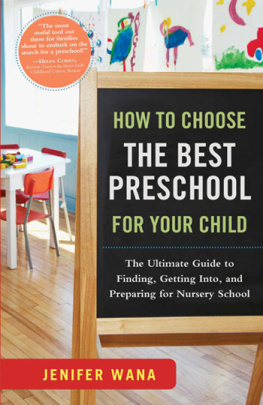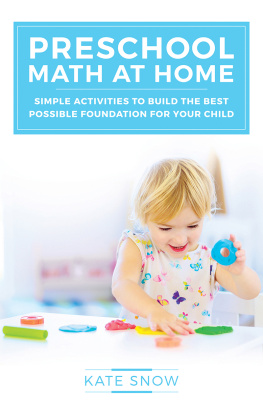Katherine A. Beauchat
Katrin L. Blamey
Sharon Walpole
2010 The Guilford Press
A Division of Guilford Publications, Inc.
72 Spring Street, New York, NY 10012
www.guilford.com
All rights reserved
2010 Epub Edition ISBN: 9781606236956
Except as indicated, no part of this book may be reproduced, translated, stored in a retrieval system, or transmitted, in any form or by any means, electronic, mechanical, photocopying, microfilming, recording, or otherwise, without written permission from the Publisher.
Last digit is print number: 9 8 7 6 5 4 3 2 1
LIMITED PHOTOCOPY LICENSE
These materials are intended for use only by qualified professionals.
The Publisher grants to individual purchasers of this book nonassignable permission to reproduce all materials for which photocopying permission is specifically granted in a footnote. This license is limited to you, the individual purchaser, for personal use or use with individual clients or students. This license does not grant the right to reproduce these materials for resale, redistribution, electronic display, or any other purposes (including but not limited to books, pamphlets, articles, video- or audiotapes, blogs, file-sharing sites, Internet or intranet sites, and handouts or slides for lectures, workshops, webinars, or therapy groups, whether or not a fee is charged). Permission to reproduce these materials for these and any other purposes must be obtained in writing from the Permissions Department of Guilford Publications.
Library of Congress Cataloging-in-Publication Data
Beauchat, Katherine A.
The building blocks of preschool success / by Katherine A. Beauchat,
Katrin L. Blamey, and Sharon Walpole.
p. cm.
Includes bibliographical references and index.
ISBN 978-1-60623-693-2 (pbk.: alk. paper)
ISBN 978-1-60623-694-9 (hard cover: alk. paper)
1. Preschool teaching. 2. Language arts (Preschool) I. Blamey, Katrin L.
II. Walpole, Sharon. III. Title.
LB1140.3B43 2010
372.1102dc22
2010003724
We dedicate this book to our families who continue to support us through all of our endeavors: Tracey, Keegan, Chloe, Chad, Owen, Andrew, Kevin, and Pete, and to the preschool teachers with whom we work and who continue to inspire us.
Katherine A. Beauchat, EdD, is Assistant Professor at York College of Pennsylvania, where she teaches undergraduate and graduate classes in literacy education. Her research interests include professional development for preschool educators in the area of literacy and language instruction and effective techniques and strategies to bolster oral language and vocabulary development for at-risk preschool children. Her recent publications include the article Building Preschool Childrens Language and Literacy One Storybook at a Time (2009), published in The Reading Teacher, and the Literacy Coaching Clearinghouse brief Facilitating Teacher Study Groups (2008).
Katrin L. Blamey, PhD, is an early childhood literacy coach at the Delaware Center for Teacher Education in Newark, Delaware, and also coaches preschool teachers at a Head Start center. Her research interests include finding effective, practical ways to implement professional development in the preschool setting and developing instructional techniques for building the language and literacy skills of preschool-age English language learners. Her recent publications include the articles Building Preschool Childrens Language and Literacy One Storybook at a Time (2009) and Elementary Literacy Coaches: The Reality of Dual Roles (2008), both published in The Reading Teacher.
Sharon Walpole, PhD, is Associate Professor at the University of Delaware School of Education in Newark, Delaware, where she teaches in both the literacy and educational leadership programs. She provides professional development for schools engaged in extensive change efforts and studies the work of literacy coaches in preschools, elementary schools, and middle and high schools. In 2007, she received the National Reading Conference Early Career Achievement Award. Her publications include two coauthored books on literacy coaching, The Literacy Coachs Handbook: A Guide to Research-Based Practice and The Literacy Coaching Challenge: Models and Methods for Grades K8, and two coauthored books on differentiated instruction, Differentiated Reading Instruction: Strategies for the Primary Grades and How to Plan Differentiated Reading Instruction: Resources for Grades K3. She is coeditor of a recent book on preschool reform efforts, Promoting Early Reading: Research, Resources, and Best Practices.
A s we wrote this book together over the past year, we were constantly challenged to focus on individual teaching goals and opportunities and on embedding them into a playful, thematically rich instructional environment. We begin with an introductory chapter, followed by chapters on oral language and vocabulary development (). This organization made the best sense for the book, but it shouldnt distract you from considering the integration of all these opportunities. Each of these instructional opportunities is connected to the others, and the particular ways that you choose to make those connections will create your unique preschool community. It might be better to think of this book as a prism, with each chapter reflecting just a piece of the light that the entire prism can capture.
If you are reading alone, we recommend that you take a quick read through the entire book. You will find that what you read in . You might then have a better sense of which approach will work in a setting more like your own.
If you can read this book with a colleague, first consider the suggestions above. But then go back to the lists of recommended print and Web-based resources. One of you can go to the library and find some of the books we have suggested; the other can use the Web to sample the sites and find the ones that seem most useful. Taking the time to decide on which resources to use, both from the library and from the Web, is really worth your effort. It will make your planning more fruitful and less harried.
When you have exhausted the content of the book and thought about and discussed it critically, it is time for planning. invites you to really think about the ways that you use time, grouping configurations, and the talents of your instructional team. We hope that there is something here that you can make your own and that it will build your sense of efficacy. We respect and appreciate your work with young children; we hope you will make support of young childrens language and literacy development a career.
Katherine A. Beauchat
Katrin L. Blamey
Sharon Walpole
Contents
A s we began work for this book, we first considered our audience. We wanted to write directly to preschool teachers, but that is easier said than done. In fact, we think that preschools are perhaps the most diverse educational settings of all. They include half-day and full-day programs; school-based, church-based, home-based, and center-based programs; programs that target creative play; and programs that target basic skills. We consider these differences as positivewe do not want all preschools to look the same. What we do want, though, is to maximize the possibilities for social, emotional, language, and literacy growth for children regardless of the type of preschool they attend.
If you work in preschool, you are part of a growing workforce. In 2006, U.S. government employment data identified 437,000 preschool teachers and projected a need for 552,000 by 2016. Unfortunately, though, that growth is not accompanied by financial incentivesthe median salary for preschool teachers is $22,680; less than the bottom 10% of elementary school teachers (Bureau of Labor Statistics, 2009).




